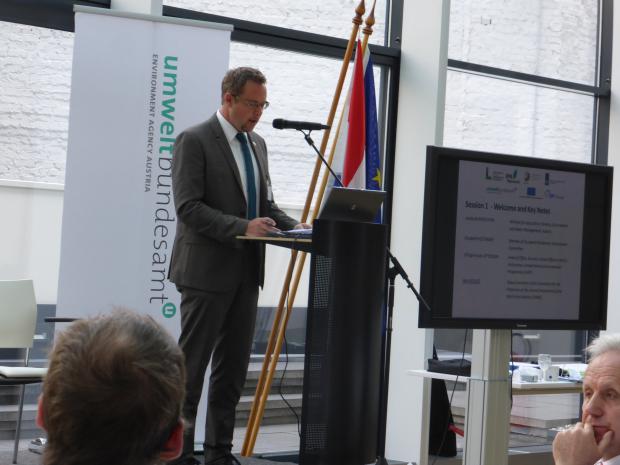‘Eliminating Plastic and Microplastic Pollution- an urgent need’
Discussion details

‘In our Oceans we have more plastic litter than fish eggs.’ (Thomas Jakl, Austrian Federal Ministry of Agriculture, Forestry, Environment and Water Management)
Brussels- At the Stakeholder Meeting entitled «Eliminating Plastic and Microplastic Pollution- an urgent need» held at the Permanent Representation of the Netherlands in Brussels on May 12, national and international experts named and contested ways in which Plastic and Microplastic Pollution in the aquatic environment can be prevented.
The four keynote speakers at the symposium were UNEP ROE Brussels’ Head of Office Ulf Björnholm, the Austrian Minister for the Environment Andrä Rupprechter, the Deputy Secretary of the Convention for the Protection of the marine Environment John Mouat and the Austrian Federal Ministry of Agriculture, Forestry, Environment and Water Management Thomas Jakl. The dual objective of the Conference was to initially frame the challenge, by exposing the alarming evidence that marine organisms at all levels of the food web ingest plastic and microplastic which is thus entering the food chain. Finally, by identifying concrete solutions to prevent plastic, used as ingredient in products as cosmetics and detergents, to be discharged into the environment through wastewater thus affecting our habitat and our health.
Mr Björnholm presented UNEP’s active work in tackling the challenge of microplastic pollution in the oceans. He began by stressing why marine plastic litter still poses a vast growing threat.
Owing principally to the recent economic growth, the production of plastic has risen exponentially, contributing to the ascension of the number of debris in our oceans.
He then identified several tangible steps for effectively eliminating plastic and microplastic pollution in the aquatic environment:
- By calling for the need to change the way we produce, use and dispose of plastic (…) and underlining the need to do it together.’, he called on governments, business and civil society to take joint responsibility to minimize plastic waste by creating the best possible conditions for plastic waste management Public awareness was also mentioned as it plays a fundamental role and consumers ‘step in’.
- Public awareness and the role of consumers to "step in" and make use of their consumer powers to choose greener products was also identified as a fundamental prerequisite for progress.
- He also pointed to the importance of public-private partnerships as an effective means to bring together the key stakeholders to identify solutions.
Finally, UNEP’s strategies and activities were outlined as a result of the growing importance of its mandate on the subject of marine litter following the United Nations Environmental Assembly (UNEA) Conference in 2014. (Click below for more information).
He concluded his intervention with a call to the European Institutions and its Member States, asking them to ‘to set the example for the rest of the world’, by showing continued environmental leadership also in view of the upcoming EU circular economy package.
Useful links
UNEA 1 Resolution on Marine plastic debris and microplastics (June 2014)
UNEP Year Book 2014 emerging issues update Plastic Debris in the Ocean
Log in with your EU Login account to post or comment on the platform.